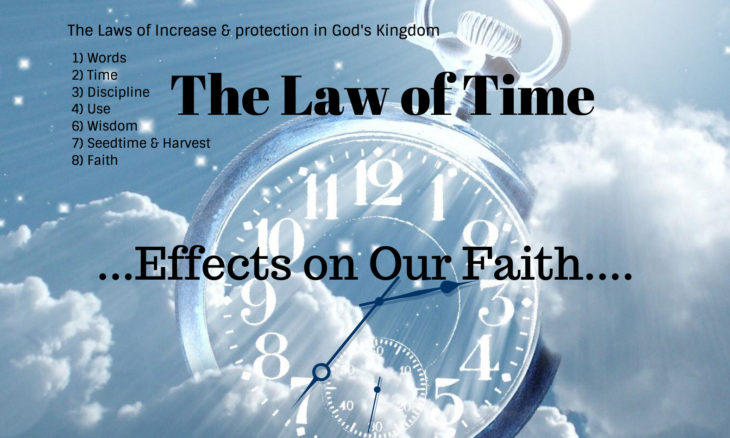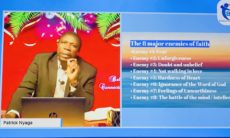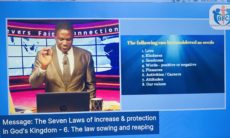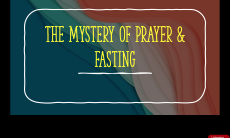Theme Scripture: 2 Peter 3:8 : “…with the Lord one day is as a thousand years, and a thousand years as one day.”
The Bible describes God’s relationship to time in other places in the Bible. Psalm 90:4 says, “For a thousand years in your sight are but as yesterday when it is past, or as a watch in the night.” Isaiah 57:15 says that God “inhabits eternity.”
We live in a physical world which has four known space-time dimensions of length, width, height (or depth) and time. However, God dwells in a different realm—the spirit realm—Our physical senses can comprehend this realm. God is not limited by the physical laws and dimensions that govern our world (Isaiah 57:15 . “God is spirit” (John 4:24),
We can say that God’s timelessness is part of His perfection. He has no need of growth or development or any of the other benefits linear time gives us. He also has no temporal beginning or end. He has neither our need for time nor our time-related limitations, which is just another example of why we can trust Him with our short temporal lives.
God’s relationship to time?
The marking of time is irrelevant to God because He transcends it. In 2 Peter 3:8,—we read that God’s perspective on time is far different from mankind’s (Psalm 102:12, 24-27). The Lord does not count time as we do. He is above and outside of the sphere of time. God sees all of eternity’s past and eternity’s future. The time that passes on earth is of no consequence from God’s timeless perspective. A second is no different from an eon; a billion years pass like seconds to the eternal God.
Though we cannot possibly comprehend this idea of eternity or the timelessness of God, we in our simple minds try to confine an infinite God to our time schedule. Those who foolishly demand that God operate according to their time frame ignore the fact that He is above time. He is eternal Father.
Again, because of our finite minds, we can only grasp the concept of God’s timeless existence in part. And in so doing, we describe Him as a God without a beginning or end, eternal, infinite, everlasting, etc. Psalm 90:2 declares, “From everlasting to everlasting You are God” (see also Psalm 93:2). He always was and always will be.
What is time?
Time is a duration. Our clocks mark change or, more precisely, our timepieces are benchmarks of change that indicate the passage of time. We could say, then, that time is a necessary precondition for change and change is a sufficient condition to establish the passage of time. In other words, whenever there’s change of any kind, we know that time has passed. We see this as we go through life, as we age. And we cannot recover the minutes that have passed by.
The science of physics tells us that time is a property resulting from the existence of matter. As such, time exists when matter exists. But God is not matter; God, in fact, created matter. The bottom line is this: time began when God created the universe. Before that, God was simply existing. Since there was no matter, and because God does not change, time had no existence and therefore no meaning, no relation to Him.
God has no beginning or end. He is outside the realm of time. Eternity is not something that can be absolutely related to God. God is beyond eternity. And this brings us to the meaning of the word eternity. Eternity is a term used to express the concept of something that has no end and/or no beginning.
Scripture reveals that God lives outside the bounds of time. Our destiny was planned “before the beginning of time” (2 Timothy 1:9; Titus 1:2) and “before the creation of the world” (Ephesians 1:4; 1 Peter 1:20). “By faith we understand that the universe was formed at God’s command, so that what is seen was not made out of what was visible” (Hebrews 11:3).
In other words, the physical universe we see, hear, feel and experience was created not from existing matter, but from a source independent of the physical dimensions we can perceive.
Time was simply created by God as a limited part of His creation for accommodating the workings of His purpose in His disposable universe (see 2 Peter 3:10-12).
Upon the completion of His creation activity, including the creation of time, what did God conclude?
God saw all that he had made, and it was very good” (Gen 1:31). God is spirit in the realm of timelessness, rather than flesh in the sphere of time.
As believers, we have a deep sense of comfort knowing that God, though timeless and eternal, is in time with us right now; And because He’s in this moment, He can respond to our needs and prayers.
We all live through extremes in life: ups and downs, highs and lows, times of the greatest joy and times of most crushing grief. The Law of Time explains these extremes, and helps identify the ways we can use our time the way God intended for us, as well as identify the ways we can appreciate each season we find ourselves in.
A new mother, for example, might long for the day when there are no more dirty diapers and no more 4 AM wakeup calls from a screaming infant. But the Law of Time teaches us that it’s all in our attitude. With God’s help, that new mother can learn to appreciate the time she has with her baby while he is still young and still wants to be held close. She can sow seeds of nurturing love while that rough season is upon her, and she will be rewarded later. Even in what seems like an extreme time, God’s promise of increase is still at work.
Click on the links below to see our recent posts on demand…
Download Audio
Download PDF









